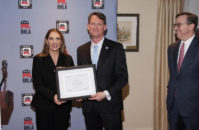Hardship surrounds Missourians due to the effects of, and the response to, COVID-19. Forced closures and significantly curtailed operations are producing lost revenue, lost wages, lost opportunities, lost education, and even lost mental health. Twelve months of perpetual COVID-19 related fears stand in the way of confident economic recovery. Current fear requires COVID-19 liability protections to exist in order for small businesses, school districts, restaurants, and many other sectors to fully reengage. Whether we like it or not, concerns about legal liability prevent our enthusiastic, yet safe, return to normalcy.

Missouri’s General Assembly must immediately respond by providing COVID-19 liability protections. We can’t allow our local business owners and those operating within other sectors to be frivolously sued. They’ve worked too hard to survive this past year just to be subsequently crushed by legal bills in defending themselves against flimsy claims of COVID-19 transmission. Thankfully, the General Assembly has the opportunity to prevent that with bills like SB 51.
We must significantly limit civil actions against Missouri’s non-profits, churches, businesses, hospitals, schools, etc., regarding frivolous COVID-19 claims. Without a bill like SB 51, our local entities will be subjected to the threat of COVID-19 related lawsuits by opportunistic lawyers. Bills like SB 51 are far from their final lap, yet I’m eager to see this effort through to the end.
Though final language isn’t certain, what is certain is that misinformation about current particulars and intent is prevalent. Given all the misinformation, I don’t blame people for their confusion. That’s why I appreciate Don Hinkle, the editor of the Missouri Baptist Convention’s “The Pathway,” for his clarifying remarks regarding SB 51. As Hinkle has highlighted, there stands no reason to oppose SB 51 on the grounds that it threatens the First Amendment rights of Missouri churches or religious nonprofits. His helpful conclusion brought an end to growing concerns focused upon that very matter. We need more of the thoughtful reflection that Hinkle has exemplified.
Issues requiring similar reflection include the removal of “safe harbor” compliance requirements, reductions of statutes of limitations, protections against vaccination mandates, and increased levels of burden of proof, all of which currently exist within SB 51. Those concerned that bills like SB 51 provide a “free pass” to hospitals will find that no such pass exists. Additionally, the bill doesn’t exempt COVID vaccines from potential liability, nor does it provide a shield to big pharma. We must reflect upon all of these matters to avoid misunderstanding.
Is SB 51, or any other COVID-19 liability bill, perfect? No. Will it ever be? No. I wish we’d secured liability protections seven months ago. The fact that we can’t “grandfather” COVID-19 liability protections is both a reality and a problem. This problem, however, can’t stand in the way of our obligation to protect local entities against future claims. Nor can it stand in the way of what’s needed for confident economic recovery and reengaged schools in our local communities.
I encourage those concerned about our economic recovery, as well as those concerned about reopening our schools, to reach out to their representatives to learn more about the importance of COVID-19 liability protection and why we need to get it to the governor’s desk pronto.

Rep. Doug Richey is a Republican who has represented HD 38 in Clay County since 2019.
















